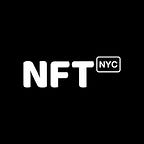By Joy Loftus
This week’s NFT.NYC Clubhouse featured six thought leaders at the forefront of NFT law.
Read on to find out more about:
- Proof of Ownership and Copyright
- Tension between Blockchain Reality and Legal Reality
Proof Of Ownership and Copyright
Audience member and NFT.NYC speaker, Mark Shekleton, asked the lawyers how an NFT creator can legally represent physical asset proof of ownership.
Daniel Payne provided Mark with a model to address this query. He talked about the patent that Nike recently obtained for issuing NFTs that are tied to a corresponding physical pair of sneakers. More about the Nike patent — https://link.medium.com/iGuxlHI3Ngb
Vandana Taxali, an arts, IP, and technology attorney as well as founder of Artcryption, gave Mark guidance on this question:
“When you’re transferring ownership, it is important to make sure that you have it in a legal contract, because the smart contract associated with an NFT isn’t a substitute for a legal contract…
You should have an associated legal contract with that smart contract outlining what the purchaser is getting.”
Vandana then talked about the importance of honoring copyrights when creating and selling NFTs, and not promising rights to an NFT buyer that you do not own. She explained:
“A digital asset is a representation of either a physical or virtual asset and it’s the creator of that asset, not necessarily the NFT creator, that is the copyright owner. It’s only the copyright owner that can license what is permitted under the copyright act.”
Artcryption uses artificial intelligence to provide alternative copyright protection for artists
Tension Between Blockchain Reality and Legal Reality
Andrew Bull, founding partner of Bull Blockchain Law, collaborated on a “Study on Blockchains” with the European Commission. A section of the publication called attention to the apparent tension between blockchain reality and legal reality.
We asked Andrew to speak to this tension:
“Ostensibly the underlying technology of a smart contract — its functionality and purpose — is to serve as a legal agreement…
But at the same time since we’re in a place of ambiguity where we have no guarantee that a decision-making authority would verify that and take it as an actual agreement, we have to rely back on the traditional notion of contract drafting.”
Vandana mentioned an important advancement reducing this tension between an existing legal framework and the blockchain:
“We are seeing courts around the world accepting blockchain-based evidence and giving effect to evidence that’s been recorded on the blockchain. Even in the US we are seeing some states changing their laws to give legal effect to records recorded on the blockchain.”
Licensing and Litigation Resources
Ghaith referenced Dapper Labs’ NFT License and NFT License 2.0 that has served as a valuable template for NFT creators and marketplaces to establish legitimate user agreements:
“The language in the NFT License 2.0 of separating the art from the token, and the language itself of the license grant, comes up in a lot of NFT marketplaces that are out there…
The marketplaces will borrow from the language of the License 2.0 that was explicitly made available for the purpose of allowing others to borrow from it.”
The NFT License 2.0 is a great resource for NFT creators and sellers that need to outline the terms and services of their NFTs.
Daniel Payne, partner at Murphy & McGonigle, offered up the audience another resource: the Blockchain Litigation Database that his firm has been compiling.
The firm began the Blockchain Litigation Database in 2018 when they began seeing the enforcement actions arising out of the ICO craze in 2017.
The partners at Murphy & McGonigle recognized that they were in the earliest innings of a long game and wanted to get on top of tracking the litigation from the beginning.
The database tracks blockchain-based litigation cases and trends.
Follow This Week’s Clubhouse Featured Speakers:
- Andrew Bull, @andrewtbull
- Ghaith Mahmood, @ghaithm
- Daniel Payne, @dpaynecrypto
- Vandana Taxali, @vandana1
- Daniel Uribe, @duribe
- Stephen Wink, @stevewink1
Next Week’s Clubhouse Topic: Brands and NFTs
Each Wednesday at 4 pm ET in the lead up to the November in-person event, NFT.NYC will host a session on Clubhouse, focused on a topic suggested by the community. Each session will include Featured Speakers from the upcoming NFT.NYC.
June NFT.NYC topics include:
- June 9th: Brands and NFTs
- June 16th: NFTs in Fintech
- June 23rd: Women in the NFT Community
- June 30th: NFTs — Identity and Social
If you’re passionate about NFTs, and have an interesting use case to share with the community, please apply at our website NFT.NYC.
Speaker applications close July 31st, 2021.
NFT.NYC Awards Dinner
NFT.NYC will soon be announcing its first NFT Awards Dinner.
The community will have an opportunity to vote on a number of NFT Awards categories.
What are some of the most significant laws that impact NFT ownership?
Royalties for resales. Smart contracts incorporated into the code of NFTs enable the distribution of cash for the payment of royalties to the inventor each time work is resold. However, these automated resale royalty payments could not occur unless the NFT’s code includes the resale in the contract. US law does not recognize resale rights pertaining to creative works, hence the law provides no redress for unpaid resale royalties in the US, as it does in around 70 other jurisdictions, including the UK and the EU.
Can someone create an NFT of any artwork even if they don’t own it?
For any work being made into an NFT, the NFT’s creator is required to get authorization by the person who owns the copyright. If this is violated, it can be considered copyright infringement.
What legal issues are presented by fractional NFT ownership?
Any company or entity that wants to create a fractional NFT must be careful about toeing the line of being an investment. As Commissioner Hester Pierce of the Security Exchange Commission said: “you better be careful you’re not creating something that is an investment product.”
